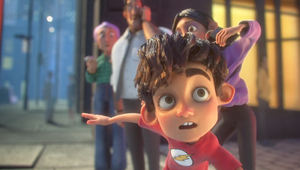
Death of the Digital Footprint?

Photo credit: Markus Spiske, Unsplash
The idea of something existing online in digital perpetuity isn't exactly new. Ever since I was a kid, the internet was always a public place, and extremely permanent. It’s seen everyday: celebrities get cancelled for a ten-year-old tweet; your friend somehow manages to find an embarrassing PhotoBooth selfie from 2010. What we put online was always intended to become part of the permanent fabric we consume every day, perhaps despite our best efforts.
This idea of the omnipresent digital footprint is rooted in the original existence of the online world: personal, and it looms over us daily. Our access to information was public, but our personal information on social media was always personal, intended for our unique communities.
From a young age, we’re taught that our presence online is not temporary - everything lives on in perpetuity. And it’s not the wrong idea - especially when you’re young and first privy to the juggernaut that is the online world, you must be careful and consider what you’re adding to it. Our output into the online world is intentional (however embarrassing a Facebook profile may have been, a decade ago). Caution is encouraged, as these people are still strangers.
While our online world was a series of private communities, a place to find your niche.
Now, our communities have become so wide scale. These people aren't strangers, they're all our friends, and we all know too much about each other.
Series of disparate private communities are now easily accessible, across a multitude of platforms (which are slowly becoming condensed into a one-size-fits-all monolith).
While every platform in the past perhaps served its own individual purpose, these lines have eroded, leaving young people to wonder what it really means to be 'private' online.
Now, the internet is a mecca of creativity. Young people have outsmarted the digital footprint, they’ve beaten it at its own game. Their personal creations, whether art, writing, projects, or something so creative I can’t really give it a name, can now be shared to everyone within seconds. And it’s not something they’re thinking will 'one-day' get back to them, it’s something to aid them in the pursuit of their niche. They want it to be public, sent out to a large community of millions of people who aren't strangers, but people they can meaningfully connect with in one way or another.
Additionally, we’re not just leaving a trail of digital breadcrumbs anymore. Teenagers send 200 Snap Chats on average a day, there are nearly 500 Million posts (used to be Tweets) daily - what was once a careful, considered output is now a digital storm. Who can really keep track of it all?
The sheer amount that’s posted to the online sphere signals that authenticity reigns supreme in our digital world. Relatable content has become the most coveted and beloved.
We’re no longer in an era of idolising influencer diets or heavily curated imagery, we want to see other people being real, de-influencing, and overall being their authentic, fun selves online, no filter needed.
To a certain extent, we’ve all become way more… honest online, sometimes excessively so.
Authenticity has become such a shareable asset that engages users, that I’ve seen more and more things I would perhaps rather die than let potential job hirers read, while still absolutely loving them.
Our online communities feel less spread out. As social media monoliths begin to overlap, with content being shared regularly across all platforms, and meccas like TikTok regularly engaging younger users, everything just feels so much more open. A rise of online para-social relationships and increased importance of authenticity makes us all really feel like friends online, which gives rise to content that I’ll politely call by its frequent comments “this is what journals are for.”
Either way, regardless of maybe the rise of oversharing online, it also indicates the internet’s value of creativity. Creativity, in any form, is meant to be circulated online. It shouldn’t be relegated to private communities, someone’s niche hobby could end up on millions of ‘For You Pages’, inspiring others to start a new hobby, and sometimes even land them a new job. We can capitalise on this community (ad revenue can get pretty lucrative), and more importantly it helps foster new, more-accessible communities online.
The digital footprint is always a pretty good guideline when it comes to operating 'online' - some things probably shouldn’t see the light of day on the same internet as your employer or professor. But it feels like the stakes of getting in trouble online are waning - people are pushing them to be more authentic. A desire to reclaim the internet from curated influencer content has changed our perception of our digital output - all in pursuit of pure, authentic fun.















